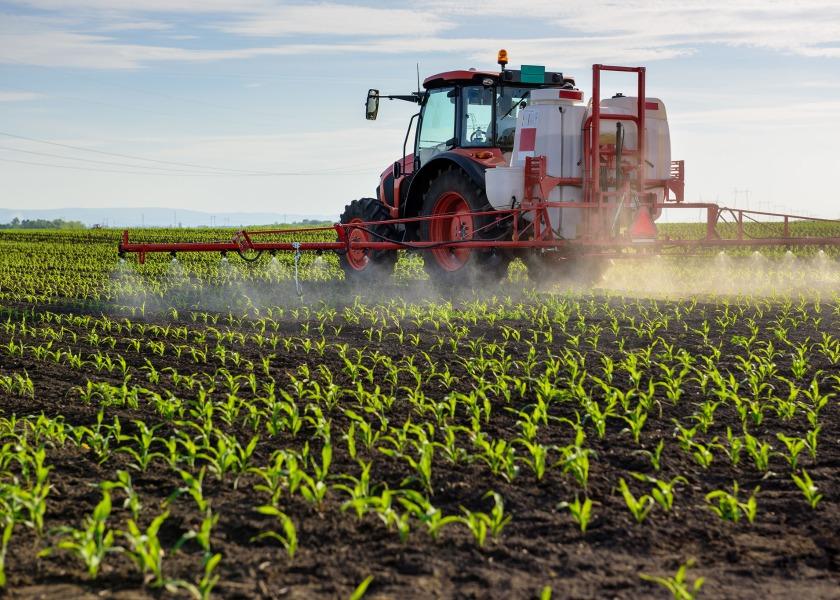California’s sustainable pesticide road map: What it is and why it matters

This year the state of California has set its sights on ambitious pest management goals in the name of improving human health and promoting ecosystem resilience, sustainable agriculture and thriving urban and agricultural communities.
To achieve this, the state's Department of Pesticide Regulation, Department of Food and Agriculture, and the California Environmental Protection Agency are working together to tackle two chief objectives by 2025: eliminating use of the worst pesticides and encouraging sustainable pest management across the state. State officials are embarking on this bold plan with what they’ve coined as the Sustainable Pest Management Roadmap, which is one part visionary north star and one part task force.
But what does this mean for produce growers across the U.S.?
If pesticide use is significantly reduced in the Golden State — which produces about half of U.S.-grown fruits, nuts and vegetables, according to the USDA — it would not only have a lasting effect on overall pesticide use; if successful, California’s pesticide road map could lead the way for other states to adopt similar sustainable pest management goals and pesticide regulations. As California goes, so does the nation.
California’s pesticide road map, explained
“For decades, California has used pesticides to protect our crops, our cities, our homes, and our businesses from pests,” Yana Garcia, California’s secretary for environmental protection, said in a news release. “Exposure to harmful pesticides carries risks — to our health and to our environment — and these risks are disproportionately borne by communities already overburdened by pollution. If we truly want to build a healthy and safe California for all, we must phase out and replace the highest-risk pesticides, and the Sustainable Pest Management Roadmap is a bold, new plan to get us there.”
According to the recently released Sustainable Pest Management Roadmap for California, the 2050 milestones set forth for pest management across the state include:
-
The state of California will have eliminated the use of what it has dubbed “priority pesticides." This is achieved by transitioning to sustainable pest management practices.
-
Sustainable pest management practices will have been adopted as the main, de facto pest management systems in the state of California.
“The Sustainable Pest Management Roadmap recognizes how the management of pest pressures is strongly interconnected with resilient farms and ecosystems, and the health of farmworkers and communities,” CDFA Secretary Karen Ross said in the release. “We have a lot of work ahead to implement the approaches outlined in the road map. However, the implementation of these recommendations will ensure an abundant and healthful food supply, protect our natural resources, and create healthy, resilient communities.”
Related news: Rains hinder early season picking for Southern California strawberries
Not only does has the road map set its sights on an ambitious goal — to ultimately reduce pesticide inputs in the state of California by 2050 — but the gathered working group setting the course of this road map is itself an achievement.
Diverse perspectives on the Sustainable Pest Management Work Group
Gathering a cross-sector array of perspectives for policy committees is a feat in and of itself, much less on a thorny topic like pesticides. California policy makers, however, have made strides in gathering together a diverse stakeholder group. Representatives of commodity associations and businesses — like almond, citrus and berries — from both conventional and organic production have taken a seat at the table alongside farmworker labor representatives, an indigenous tribal group, environmental advocates and academic researchers to tackle the road map's goals.
The work group comprises 25 members representing diverse interests to address sustainable pest management in agricultural settings, and an additional eight members formed an urban subgroup to address urban pest pressures specifically. The Sustainable Pest Management Work Group was formed in response to both a recommendation from the state’s Chlorpyrifos Alternatives Work Group, and the governor’s, CalEPA’s and DPR’s recognition of the need to accelerate a holistic, systemwide approach to safer, more sustainable pest management.
“Successfully transitioning to sustainable pest management requires collective action,” DPR Director Julie Henderson said in the release. “The critical actions outlined in the road map include prioritizing prevention, coordinating state-level leadership, investing in building knowledge about sustainable pest management, improving the state’s registration and evaluation process to bring more sustainable alternatives to market and enhancing monitoring and statewide data collection to better inform actions.”
Despite the bold goals and diverse voices at the table to shepherd paradigm-shifting policies for the state, some grower groups believe more should be done before restricting certain pesticides.
“The California Department of Pesticide Regulation must move quickly to register effective and efficient alternatives prior to imposing new use restrictions on existing pesticides,” Western Grower’s Vice President of State Government Affairs Matthew Allen said in a statement. “The department must continue to use the best available scientific data and methods in evaluating pesticides and they, frankly, have a duty to remind the public that California already has the most comprehensive regulatory system in place that protects the health and safety of applicators, bystanders and surrounding communities.”
Weigh in and learn more about California’s pesticide road map
Public comment regarding the prioritization and implementation of the Sustainable Pest Management Roadmap's next steps is open until March 13, 2023.
Comments can be sent to alternatives@cdpr.ca.gov or by mail to 1001 I Street, P.O. Box 4015, Sacramento, CA 95812. Comments received will be considered as part of the state-level coordination on implementing the recommendations in the Sustainable Pest Management Roadmap.
More information about the road map will be available from the California’s Department of Pesticide Regulation through informational webinars:
-
Two webinars on Feb. 28, 2023, will address the road map’s recommendations for urban pest management. Sessions are at 10 a.m. PST and 5:30 p.m. PST on Zoom.
-
Two webinars on Mar. 2, 2023, will address the road map’s recommendations for agricultural pest management. Sessions are at 10 a.m. PST and 5:30 p.m. PST on Zoom.







